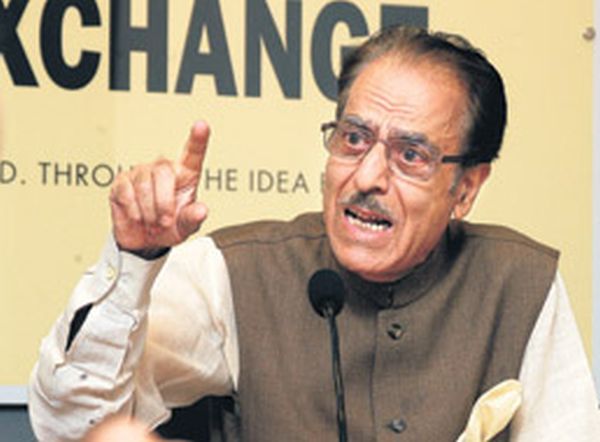
Claiming that former Pakistan President Pervez Musharraf’s assessment over a decade ago that Kashmiris will “prefer to be independent” if they are given a chance to “exercise their free will” seems to be “correct even today”, Congress veteran Saifuddin Soz, Union Minister in the UPA-I government, has argued in his forthcoming book that the central government should first open dialogue with the Hurriyat Conference before moving to mainstream parties to find a solution to the Kashmir issue.
He also makes the claim that “blunders” committed by various central governments since 1953 — a period that also covers governments headed by Jawaharlal Nehru and Indira Gandhi — alienated Kashmiris from India’s heartland. In his book Kashmir: Glimpses of History and the Story of Struggle, which will be released next week, Soz says the primary responsibility to find a solution to Kashmir lies with the Centre, which has to show “a gesture of compassion for creating a situation of relief in the minds of Kashmiris” and initiate a dialogue with the people.
“And, if the Union of India has to talk to the people of Kashmir, it will have to decide the grouping with which it will initiate the dialogue. In my opinion, it is the political conglomerate called the Hurriyat. Then, the ball will certainly move to what is broadly known as the ‘mainstream’,” Soz writes in the book published by Rupa Publications.
Soz talks about the “so-called Musharraf-Vajpayee-Manmohan formula” which he says had envisaged same borders but free movement across the region, autonomy on both the sides and demilitarisation. Quoting credible sources, he says Musharraf had convinced his top colleagues, both in the army and outside, that it was the only possible solution.
“He (Musharraf) had also convinced his colleagues that the resolutions of the UN on Kashmir had constituted a redundant situation as these meant a tight-jacket for Kashmiris whether they wanted to go with India or to Pakistan. Musharraf had explained that if Kashmiris were given a chance to exercise their free will, they would prefer to be independent. In fact, this assessment of Musharraf seems to be correct even today!” he writes.
Soz says the government “should have realized much earlier that it was wrong for it to dilute the autonomy that was enshrined in Article 370 of the Constitution of India and the Delhi Agreement of 1952 between (Jawaharlal) Nehru and the Sheikh.”
“Nehru had realized that India’s policy had gone wrong in Kashmir and it was the greatest blunder committed by the Government of India to have dismissed and arrested the Sheikh unconstitutionally. Nehru had regretted the action, but the Union of India itself hadn’t learnt the lesson as it repeated its mistake by incorporating a clause in the Indira-Abdullah Accord of 1975 aimed at examining all the central laws promulgated in Jammu & Kashmir since 1953, but never showed its nerve to implement the same,” he adds.
Soz says the Centre repeated blunders by dismissing the Farooq Abdullah government in 1984 and then appointing Jagmohan as the Governor for the second time in 1990 despite protests by the Farooq Abdullah government.
“So, it is the Union of India that caused unrest in the minds of the people of Kashmir and deepened it over a period of time by committing mistakes one after the other. The Union of India has to adopt a mechanism to assess properly as to what has gone wrong and how it can be corrected,” he says, adding that the Centre should realise that no amount of repression in Kashmir, be it through bullets or pellets, can solve the problem. He calls for scaling down troop presence in Kashmir and revocation of the “draconian” AFSPA.



